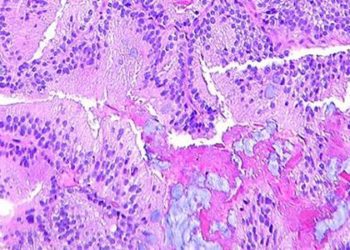Epcoritamab shows promising response rates seen in relapsed or refractory non-Hodgkin lymphoma
1. Full-dose regimens of 48-60 mg achieved clinically significant response rates varying from 68-100%.
2. No dose-limiting toxic effects were observed, and no patients discontinued treatment due to toxic effects.
Evidence Rating Level: 1 (Excellent)
Study Rundown: Nearly half of patients treated for non-Hodgkin lymphoma become treatment refractory or relapse after treatment. Epcoritamab, a bispecific CD3 and CD20 antibody, is a potential subcutaneous therapy that has shown promise in other hematological malignancies. In this phase I/II drug study, 68 patients with relapsed or refractory B-cell non-Hodgkin lymphoma received escalating doses of epcoritamab. The primary outcome was to determine a maximum tolerated dose and a recommended phase II does for epcoritamab. Epcoritamab was relatively well-tolerated, as no dose-limiting toxic effects were observed, and no discontinuation was seen due to toxic effects. The most common adverse event was fever, usually associated with cytokine release syndrome (CRS). All cases of CRS were grade 1-2 and did not require ICU admission. More than half of patients discontinued treatment due to disease progression. During treatment, 16% of patients died due to disease progression and this would increase to 56% during follow-up. However, treatment response was reported in many patients, varying from partial response of 68%-100% depending on dosages and cancer subtype. In the end, 48 mg of subcutaneous epcoritamab was determined to be the recommended dose for continued evaluation in clinical trials with no maximum tolerated dose reached in this trial.
Click to read the study in the Lancet
Relevant Reading: Outcomes in refractory diffuse large Bcell lymphoma: results from the international SCHOLAR1 study.
In-Depth [randomized controlled trial]: This phase 1/2 drug study was started across Denmark, the Netherlands, the UK, and Spain in 2018. Eligibility criteria for this study included patients aged 18+ with relapsed, progressive, or refractory CD20+ mature B-cell non-Hodgkin lymphoma. All subtypes of B-cell non-Hodgkin lymphoma were included. All patients were to be previously treated with the standard treatment of a CD20 monoclonal antibody regimen. The dose-escalation (phase 1) regimen for this study was defined as a priming dose on day 1, an intermediate dose (1.5 mg) on day 8, followed by 28-day cycles of full-dosages (0.0128 mg – 60 mg). Cycles 1 and 2 were weekly injections, 2-6 were every two weeks, and 7+ were every 4 weeks. Injections were given with corticosteroids, antipyretics, and antihistamines. Dose escalation was determined by observation of dose-limiting toxic effects. Treatment response was evaluated every 6 weeks for the first 24 weeks, followed by every 24 weeks after. Radiographic disease was measured by FDG-PET-CT scans.
68 patients (34% female) partook in this study with an average age of 68 years (IQR 57-75). 68% of patients discontinued treatment due to disease progression with only 22% of patients remaining on the treatment until the end of the study period. 16% of patients died during the treatment period, all due to disease progression, and this increased to 56% of patients during post-treatment follow-up. Serious adverse events occurred in 68% of patients, with 28% of total patients experiencing serious pyrexia. There were no discontinuations due to treatment-related adverse events.
In those with diffuse large B-cell lymphoma, 68% (95% CI 45-86%) responded to treatment (45% complete response). There was a dose-related effect seen. The response rate was 88% (47-100) at 48 mg and 100% (29-100) at 60 mg. For those with follicular lymphoma, response rate was 90% (50% complete response) at 0.76-48 mg.
Image: PD
©2021 2 Minute Medicine, Inc. All rights reserved. No works may be reproduced without expressed written consent from 2 Minute Medicine, Inc. Inquire about licensing here. No article should be construed as medical advice and is not intended as such by the authors or by 2 Minute Medicine, Inc.








